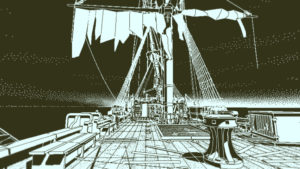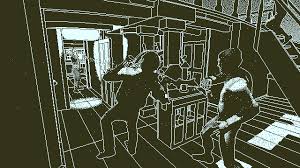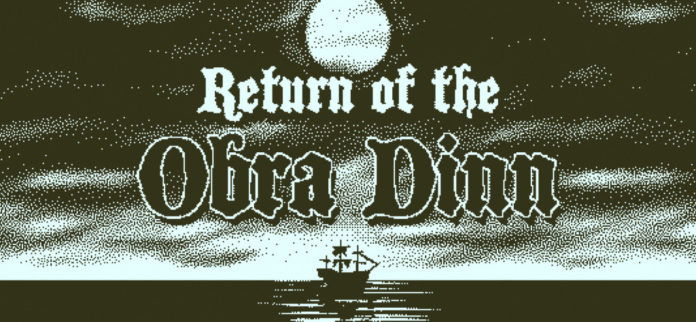Return of the Obra Dinn is the second bureaucracy simulator from Lucas Pope, the auteur behind Papers, Please. A game of logic both captivatingly brilliant and fascinatingly unique, Obra Dinn asks its players to analyze minute details in order to solve a vast, interconnected mystery: the fate of the Obra Dinn, an East India Company merchant ship presumed lost at sea that one day in 1807 unexpectedly drifts into port. Taking on the role of an insurance agent, the player’s job is to determine what happened to the ship and its now-deceased crew members.
The Game
Studying everything from the ship’s log to the sun-bleached bones of the crew, the player must determine the name and cause of death of every person onboard the Obra Dinn. With no real instruction from the game as how to proceed, the player must surmise each crew member’s identity based on his role on the ship, his clothes, his relationship to the other members of the crew, and what he was doing at the moment of death of a fellow crew member.
The player benefits from the game’s “Memento Mortem,” a magic watch that can replay the “memory” of the moment a person died. Because the Memento Mortem shows you what has happened, determining the manner of death of any individual sailor is easy enough, but deducing the identity of each character is the real challenge and the real fun.
For example, you encounter a character with several Polynesian or tribal looking body tattoos; checking the ship’s manifest reveals that there is one crewman from Sierra Leone and one from New Guinea, so you can deduct that the tattooed man is likely one of those two men. Another instructive example involves observing a character tend to a crew member with lung disease, suggesting that the character must be a doctor or surgeon of some sort.

There are several features added on to this core system that make solving each fate less frustrating. You have both a crew manifest that lists the name, role, and country of origin of every person on the ship and several sketches that collectively show the faces of every person on the ship.
Fates are confirmed only when you have three correct at the same time, making guessing until the game indicates you are correct much harder. Each victim’s face is blurred out until you have seen the memory that makes him identifiable, preventing you from being frustrated while trying to guess an identity you cannot solve yet.
Finally, the game lists all the memories in which each victim appears, making it easy to review all the information you’ve discovered when going back to revisit a death you could not solve immediately.

The art style is a deliberate combination of early 3D graphics and a gameboy two-color palette. This combination results from Pope’s attempt to turn the limitations of his one-man shop into an interesting style, but it also manages to make the various violent deaths in the game never be too gory or disgusting. Also worth noting, the game’s music and voice acting astound, each subtly contributing to Obra Dinn’s otherworldly feel.
Thoughts
The issues I have with this game are small. Searching your book of fates can be clumsy because the only way to navigate is to flip to the index and then click on the desired section, but this inefficiency only wastes a few seconds at a time. There’s no in-game system for taking notes, which would be useful, but you obviously can use your own pen and paper for notetaking. Finally, as with any game of this nature, it’s frustrating to be stuck and feel like you have no clues, but continuing to re-watch the memories tends to help you notice new details eventually, and the extremely challenging nature of the game is part of its allure.
In Summary
Unlike anything else out there, Return of the Obra Dinn is certainly worth the $20 it costs on Steam and is a real bargain when it goes on sale, as it frequently does during Steam’s seasonal sales. Whether or not the game’s core loop of looking at memories for clues, making deductions and inferences, and ultimately logically solving the mystery of the Obra Dinn appeals to you is something you either will find engaging or you won’t, but nonetheless the game is brilliant, its uniqueness alone a marker of its greatness. Even if whodunnits typically do not appeal to you, this mystery is worth investigating.
I give Return of the Obra Dinn
Like it/Love It/Gotta Have It






